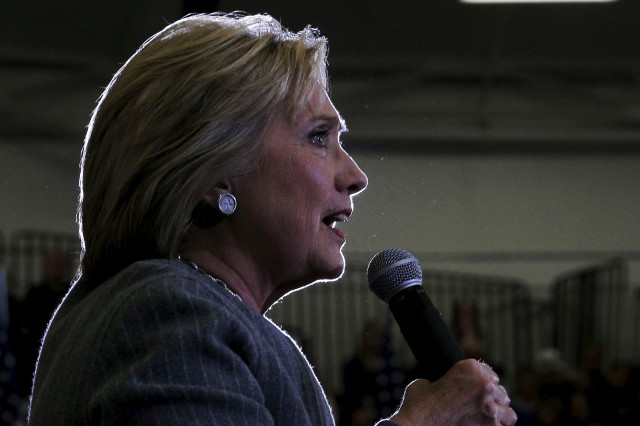By Barbara Slavin
With the results of the New York primary in, former Secretary of State Hillary Clinton once again seems to be the inevitable Democratic nominee, and Vermont Senator Bernie Sanders is back to being a longshot.
Before he fades into campaign history, however, Sanders deserves credit for pushing uncomfortable truths about the American political and economic establishment and for touching what was once the third rail of American politics on foreign policy – unflinching support for the government of Israel.
A secular Jew and Democratic Socialist who lived on a kibbutz as a young man, Sanders has more ethnic leeway than Christian candidates to criticize Israeli policies. Still, it was refreshing to hear his comments at the pre-New York primary debate last week chiding Israel that combatting terrorism is not sufficient to ensure the country’s survival.

Democratic presidential candidate Bernie Sanders speaks during an election rally in Erie, Pennsylvania on April 19, 2016. (Reuters)
Sanders began by affirming previous remarks that Israel’s response to rocket attacks in 2014—a bombing onslaught on Gaza that killed 2,000 people and demolished much of Gaza’s infrastructure—was “disproportionate.”
“As somebody who is 100% pro-Israel, in the long run — and this is not going to be easy, God only knows, but in the long run if we are ever going to bring peace to that region which has seen so much hatred and so much war, we are going to have to treat the Palestinian people with respect and dignity, ” Sanders said.
He went on to say, “There comes a time when if we pursue justice and peace, we are going to have to say that [Israeli Prime Minister Benjamin] Netanyahu is not right all of the time…. All that I am saying is we cannot continue to be one-sided. There are two sides to the issue.”
The audience in Brooklyn greeted his remarks with enthusiastic applause and cheers.
Clinton focused more on the crimes of the militant Palestinian group, Hamas, and its placement of weapons and fighters in the midst of civilian populations.
After Israel withdrew unilaterally from the territory in 2005, “Hamas took over Gaza,” Clinton said. “So instead of having a thriving economy with the kind of opportunities that the children of the Palestinians deserve, we have a terrorist haven that is getting more and more rockets shipped in from Iran and elsewhere.”
But she also cited her long record dealing with Israelis and Palestinians and helping to broker a 2012 cease-fire after a previous outbreak of Israel-Hamas hostilities as well as a failed attempt at Israeli-Palestinian peace negotiations.
“I was absolutely focused on what we needed to do to make sure that the Palestinian people had the right to self-government,” Clinton said. “And I believe that as president I will be able to continue to make progress and get an agreement that will be fair both to the Israelis and the Palestinians without ever, ever undermining Israel’s security.”

Democratic presidential candidate Hillary Clinton speaks during a “Get Out to Caucus” rally in Council Bluffs, Iowa on January 31, 2016. (Reuters)
Clinton’s remarks may have helped her win the votes of older New York Jews. But Sanders is speaking to a younger generation of American Jews and other millennials, who are increasingly alienated by Israeli policies.
Groups such as J-Street, which held its annual convention in Washington this week, and the Jewish Voice for Peace, would like to see a the next American president more willing to use this country’s leverage as Israel’s only significant ally to promote an equitable Palestinian-Israeli peace agreement.
At a minimum, they expect Israel to stop thickening Jewish settlements in the West Bank that make a two-state solution increasingly implausible. Otherwise, Israel will lose its character as a democratic Jewish state and Palestinians—who have conducted a terrifying campaign of random attacks on Israelis over the past seven months—are likely to become even more frustrated and nihilistic.
Relations between the Barack Obama administration and the Netanyahu government have become increasingly strained over Netanyahu’s aggressive lobbying against the Iran nuclear deal as well as Israeli settlement policies.
Vice President Joe Biden, addressing the J-Street convention, harshly criticized Palestinian Authority President Mahmoud Abbas for failing to condemn the recent terrorist attacks on Jews. But he also had tough words for Netanyahu. “I firmly believe that the actions that Israel’s government has taken over the past several years—the steady and systematic expansion of settlements, the legalization of outposts, land seizures — they’re moving us and more importantly they’re moving Israel in the wrong direction,” Biden said.
All sides to the dispute agree that the climate for a deal now is poor. Obama is a lame duck, Palestinian leadership is divided and weak and Israel is not in a compromising mood.
There is considerable speculation that the Obama administration will make some sort of unilateral move on Israel and the Palestinians before it leaves office – backing a U.N. Security Council resolution with new parameters for a peace deal, for example.
If Clinton becomes the next president, those parameters could serve as a base line for another attempt to restart peace negotiations.

Republican presidential candidate Donald Trump smiles while speaking at a rally in Des Moines, Iowa on Jan. 28, 2016. (AP)
Even Donald Trump, whose own march to the Republican nomination now looks less shaky after New York, has suggested at various points that he would also try to broker a Palestinian-Israeli peace deal while conceding that it would be “is a very, very tough agreement to make.”
The next president of the United States will likely face more pressing foreign policy priorities – combatting the Islamic State, shoring up the governments of Iraq and Afghanistan and dealing with Iran and its adversaries across the Persian Gulf. Trump’s stated preference is to renegotiate trade deals and stop illegal immigration.
Still, whoever occupies the Oval Office next January is likely to meet early with the leader of Israel and the conversation, to quote Sanders, should not be “one-sided.”
Only Israel can decide its policies going forward. That said, Israel’s best friend is entitled to an opinion and Sanders deserves admiration and respect for expressing his so forcefully.
Barbara Slavin is Acting Director of the Future of Iran Initiative at the Atlantic Council in Washington.

